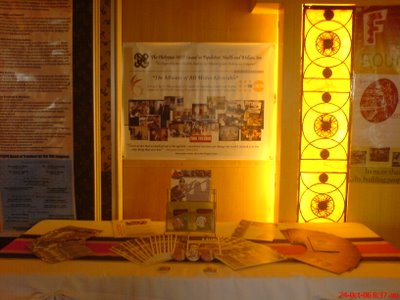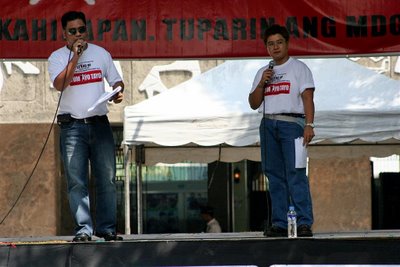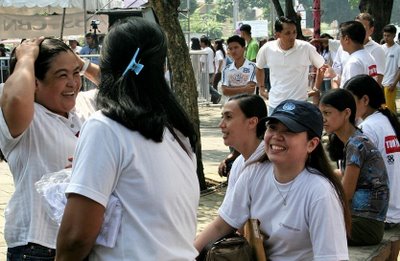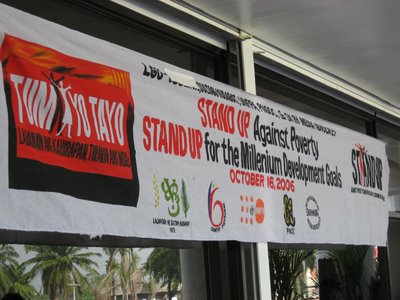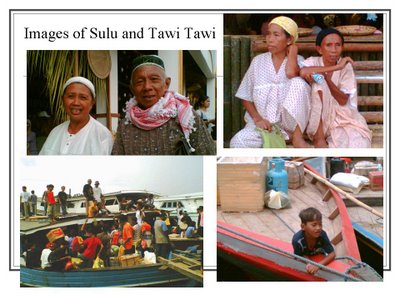A Blessed and Blissful NEW YEAR!!!
Bagong Simula sa Bayan ni Juan
Breaking News
Sunday, December 31, 2006
Have a blissful NEW YEAR!
A Blessed and Blissful NEW YEAR!!!
Posted by PhilMADE at 9:35 PM 0 comments
Tuesday, December 19, 2006
The PDS Advocacy Team
Watch the MTV we did, using the Pinoy Dream Academy (PDA) theme as music...
The PDS (Population Development Strategies) Advocacy Cluster namely, POPCOM-PMO, PNGOC, PLCPD, ECOP and FORUM presented this MTV during the UNFPA party last Decemeber 15, 2006 held at J.V. Del Rosario Ballroom, 4th Floor, AIM Conference Center, Legaspi Village, Makati City...
Guided by its lyrics, Paolo and I chose pictures to match the song...
This was the way we sang the song... (we changed some of it to suit our advocacy: read below)
Watch the MTV and sing with it... =)
and to Paolo, special thanks for the effects and the logo of "PDS Academy" in the MTV...
PDS THEME
Ang bawa't tao'y magkakaiba
Iyong makikita
Iba't Ibang istorya... Iba't Ibang paniniwala
Ngunit... Nagsisikap
Para sa Pangarap
Magsakripisyo
pawis binubuno
Nagbabago... Ganyan ang tao...
Itanim sa puso dahil.....
CHORUS:
Nais nating marating
"PAGPASA ng RH BILLS"
Di kami titigil
papatunayan sa buong mundo
Kayang kaya natin to...
Di kami susuko...
---------------
Nag-iisang damdamin
ang ating aawitin
ihahayag ating mithiin
Itatayong Bandila, ng "adbokasiya"
Pilipino taas ang kamay, umawit ka at...
Ika'y magsikap...
Para sa pangarap...
Magsakripisyo...
Pawis Ibuno...
Ika'y matuto
Ganyan ang tao...
Itanim sa puso dahil....
CHORUS:
Nais nating marating
PAGPASA ng RH BILLS
Di kami titigil
Sisigaw sa buong mundo
Kayang kaya natin to...
Di kami susuko...
BRIDGE:
Nakikinig ka ba?
Imulat mo ang inyong mga mata
"Dinggin ang sigaw ng aming damdamin..."
"Ito ang aming hangarin…."
Repeat CHORUS
Posted by PhilMADE at 12:12 PM 0 comments
Thursday, December 14, 2006
Lybrel: the pill that eliminates the menstrual cycle...
From livescience.com.
A new year-round contraceptive pill called Lybrel, which eliminates menstrual cycles altogether, appears to be safe and effective, researchers report.
Lybrel is not yet approved by the U.S. Food and Drug Administration, but a decision is expected next year. Currently, there are contraceptives available that reduce the number of menstrual periods to four a year, but this is the first study that shows it is safe to eliminate menstrual periods. The report is published in the December issue of Contraception.
"One advantage to using this pill is that you take one pill regularly with the expectation that you are not going to have a regular menstrual bleeding period," said lead researcher Dr. David F. Archer, a professor of obstetrics and gynecology at Eastern Virginia Medical School.
The downside is that some women who use this pill will have some bleeding or spotting, Archer said. "You get rid of the anticipated menstrual period, but you replace it with some erratic, unpredictable bleeding or spotting," he said. "So, this is a group of women who are going to be willing to put up with that type of nuisance bleeding."
This unpredictable bleeding and/or spotting affects about 20 percent of the women taking the pill after a year, and it can last up to six days, Archer said. "It's impossible to predict which women will have bleeding and spotting," he added. However, it is the main reason that 18.5 percent of the women of the 8 percent who quit the study quit, he noted.
Another benefit to this pill is the elimination of menstrual cycle-related symptoms, such as mood changes, menstrual cramps and headaches, Archer said. In the study, which was conducted at 92 sites in North America, Archer's group used a birth-control pill consisting of 20 micrograms of ethinyl estradiol and 90 micrograms of levonorgestrel. The pill was developed by Wyeth Pharmaceuticals.
The researchers gave the pill to 2,134 sexually active women, aged 18 to 49. The women took a pill daily without any breaks.\nDuring the 18 months of the study, the number of days of bleeding decreased progressively. After one year, 79 percent of the women reported an absence of bleeding. Moreover, 58.7 percent of the women reported having no menstrual cycles. In addition, only about one woman out of a hundred will become pregnant while taking the pill, Archer said. One expert says that because of the incidences of bleeding, this pill isn't for every woman. "The main advantage is that this continuous pill provides a lower dose than other continuous oral contraceptive pills like, Seasonale," said Dr. Philip D. Darney, chief of Obstetrics, Gynecology and Reproductive Sciences at San Francisco General Hospital and the University of California, San Francisco. "Women who want to avoid menses and take a pill continuously, which for some women may provide greater efficacy and fewer side effects, will be able to use an 'ultra low-dose' pill, which may have some advantages for rare adverse effects of oral contraceptives, like thrombosis," Archer said. "Still, the main reason for stopping this pill was bleeding disruptions, so, it won't suit all pill users."Another expert is concerned with the high number of women who continued to experience bleeding while taking the pill."I think continuous contraception is a great idea," said Dr. Camelia Davtyan, an assistant professor of medicine at the University of California, Los Angeles. "Nevertheless, the rate of uterine bleeding-related complications is quite high."Davtyan thinks that to really test its efficacy, this new pill should be tested against the standard birth-control pill in a clinical trial. In addition, she said she is concerned that nothing is known about any side effects from the long-term use of this pill.
The researchers gave the pill to 2,134 sexually active women, aged 18 to 49. The women took a pill daily without any breaks.
During the 18 months of the study, the number of days of bleeding decreased progressively. After one year, 79 percent of the women reported an absence of bleeding. Moreover, 58.7 percent of the women reported having no menstrual cycles.
In addition, only about one woman out of a hundred will become pregnant while taking the pill, Archer said.
One expert says that because of the incidences of bleeding, this pill isn't for every woman.
"The main advantage is that this continuous pill provides a lower dose than other continuous oral contraceptive pills like, Seasonale," said Dr. Philip D. Darney, chief of Obstetrics, Gynecology and Reproductive Sciences at San Francisco General Hospital and the University of California, San Francisco.
"Women who want to avoid menses and take a pill continuously, which for some women may provide greater efficacy and fewer side effects, will be able to use an 'ultra low-dose' pill, which may have some advantages for rare adverse effects of oral contraceptives, like thrombosis," Archer said. "Still, the main reason for stopping this pill was bleeding disruptions, so, it won't suit all pill users."
Another expert is concerned with the high number of women who continued to experience bleeding while taking the pill. "I think continuous contraception is a great idea," said Dr. Camelia Davtyan, an assistant professor of medicine at the University of California, Los Angeles. "Nevertheless, the rate of uterine bleeding-related complications is quite high."
Davtyan thinks that to really test its efficacy, this new pill should be tested against the standard birth-control pill in a clinical trial. In addition, she said she is concerned that nothing is known about any side effects from the long-term use of this pill.
Posted by PhilMADE at 10:10 AM 0 comments
LGBT organisations recognized by UN-ECOSOC
Yesterday, 11 December 2006, the United Nations Economic and Social Council (ECOSOC) granted consultative status to three gay, lesbian, bisexual and transgender organisations: to ILGA-Europe, the European Region of the International Lesbian and Gay Association, to the Danish and German national lesbian and gay association, LBL and LSVD. Consultative status granted by the ECOSOC allows NGOs to enter the United Nations, participate in its work and speak in their own name. No other LGBT group till this day enjoyed this right, apart from COAL, the Coalition of Activist Lesbians, a group based in Australia.
“State homophobia has been hit and will not remain unchallenged anymore,” says Rosanna Flamer Caldera, Co-Secretary General of the International Lesbian and Gay Association. “It is a very special moment for the LGBT movement: this historic decision follows the statement made by Norway at the UN Human Rights Council on behalf of 54 countries, pushing that forum to address sexual orientation and gender identity.
ILGA, a federation of 550 LGBT groups around the world, has been working for a number of years to have sexual orientation and gender identity come out at the United Nations. The first speech at the UN on LGBT rights was given in its name in 1992. In 2006, ILGA held its world conference in Geneva, European headquarters of the United Nations and organised four panels on LGBT issues at the second session of the Human Rights Council. ILGA also initiated a campaign to have an increasing number of LGBT groups apply for ECOSOC status. In a clear demonstration of uneasiness and an attempt to avoid any debate on the topics of sexual orientation and gender identity, countries sitting at the ECOSOC postponed the debate, using procedural manoeuvres from one meeting to another.
“This last meeting of the ECOSOC is the fourth this year where countries have had to discuss these applications from LGBT groups,” comments Rosanna Flamer-Caldera. “Some states argue or fear we may be asking for special rights and use this as an alibi to block us from entering the UN,” she continues. “This is not a question of special rights. It is a basic question of equality and universality of human rights. We demand the right not to be discriminated against on the grounds of who we are, as lesbians, gays, bisexual and transgender persons.
On the international level, this starts with the United Nations recognising the mere fact LGBT people exist, that they can organise as groups and, as such, participate in UN work and protest against the many human rights violations we still suffer from around the world”.
ILGA thanks the many NGOs which have supported this campaign - with special recognition to Arc International and ISHR, the International Service for Human Rights.
In 2007, applications from seven other LGBT groups will be considered by the ECOSOC. Patricia Curzi & Stephen Barris ILGA, International Lesbian and Gay Association
Posted by PhilMADE at 9:39 AM 0 comments
Tuesday, December 12, 2006
Ifugao execs pass Reproductive Health Law... 2nd in the Philippines
Published on page A18 of the December 4, 2006 issue of the Philippine Daily Inquirer
BAGUIO CITY -- Ifugaos are now guided by a law that protects their reproductive health rights.
The Ifugao Reproductive Health and Responsible Parenthood Ordinance of 2006 (Provincial Ordinance 2006-033) was highlighted as an important piece of local legislation during the World’s AIDS Day celebrations in Lagawe town on Dec. 1.
The ordinance is the second to be approved in the country after Aurora province.
Ifugao Gov. Glenn Prudenciano, who authored and pushed the measure through the provincial board as vice governor in August, said he based his draft measure on the same principles offered by the pending national reproductive health bill.
Prudenciano assumed the gubernatorial post in November after the death of Gov. Benjamin Cappleman.
He said Ifugao residents discovered that there was nothing to fear from reproductive health policies that some critics have labeled as the foundations for an abortion law.
Like the draft reproductive health bill still awaiting plenary discussions in Congress, the Ifugao ordinance makes it the government’s duty to make information, health care services and medicine available to Ifugao residents regardless of their cultural or religious affiliations.
The ordinance states that it is the Ifugao residents’ right “to decide freely and responsibly the number, spacing and timing of [giving birth to] their children, [as well as] to make other decisions concerning reproduction free of discrimination, coercion and violence.”
The law grants residents full understanding of all birth control options available to them, Prudenciano said.
The law also obliges government teachers to provide classrooms and out-of-school youths all information necessary to explain to them what reproductive health and sexuality are all about.
Prudenciano said the local government has taken into account the impact of uncontrolled population growth on their economy.
He said Ifugao, until recently, was considered the fourth poorest province in the Philippines.
“Government decided we must graduate [from that rank] so it pumped investments into the province. But I realized that it was not enough because we have a large population who are leaving because they no longer have lands to till,” Prudenciano told the Inquirer.
Providing Ifugao residents proper information about population management and insights into their sexuality is “foresight,” he said, for the local government to sustain economic growth.
Cultural dimension
But there is also a cultural dimension that makes the law necessary, he said.
Ifugao tradition places a high value on family, so some men would replace wives who could not bear them children, he said.
Prudenciano said the law empowers women to deal with this male-centered bias, which still surfaces in some communities of Ifugao province “despite the fact that the general population is now younger and educated.”
“Highland Thoughts,” a compilation of essays, short stories and poems written by Ifugao youths, also showed how tradition could help Ifugaos plan their families.
An article written by Manuel Dulawan enumerates age-old Ifugao values that, he said, are still relevant to present-day family planning principles. Dulawan said Ifugao’s complicated courtship period, the ritualistic obligations once a betrothal is arranged and a “trial period” among couples could delay marriage. He also cited tribal inheritance customs that say “only the first [two] children of the couple are entitled to inherit their parents’ property.”
Article written by: Vincent Cabreza, Inquirer Northern Luzon
Click this link to view article on the web:
http://newsinfo.inq7.net/inquirerheadlines/regions/view_article.php?article_id=36219
Posted by PhilMADE at 1:29 AM 0 comments
Monday, December 11, 2006
mga "patikim na pics" nung Project Review and Media Planning
Posted by PhilMADE at 12:53 AM 0 comments
Wednesday, November 29, 2006
MUSLIM INSURGENTS URGES FELLOW MUSLIMS IN SOUTH TO PRACTICE MANILA'S BIRTH SPACING PROGRAM ...
Eid Kabalu, spokesperson for the 11,900 strong Moro Islamic liberation Front (MILF), told AdnKronos International that the Assembly of Darul-Iftah, an organization of Islamic religious authorities or imams, has issued guidelines on Philippines President Gloria Macapagal-Arroyo's birth spacing program.
"There's nothing wrong with family planning program. It was reviewed by the Darul-Iftah and they are also endorsing it," Kabalu said.
"We are advising our fellow Muslims to coordinate with government health workers. We encourage Muslim couples to practice it because it will help in all aspects of human life," he added.
The Philippines is 85-percent Catholic. The Church allows only natural family planning methods and considers the use of artificial means of birth control a grievous sin.
Manila's health department family planning program is based on responsible parenthood, which gives married couples the responsibility of spacing their children.
"The government is not banning having children. But what the government is proposing under birth spacing is to lower the birth rate based on the natural cycle of women," regional health officer Abdullah Dumama told AKI.
According to Dumama, a sound population control program would create an informed citizenry, which would in turn practice birth spacing that would result in fewer births.
However, Kabalu stressed that a family planning program for the Muslim community should be anchored on the principles of non-coercion, responsible parenthood and informed choice."
"It does not refer to abortion, neither to birth control but birth or child spacing and should be the couple's decision," he said, quoting what the late MILF chairman, Salamat Hashim, once had told him.
To strengthen his point, he reminded that in 2004, 22 Muslim religious leaders signed a 'fatwah,' – religious edit - affirming that "improved reproductive health conditions benefits individual Muslims and strengthens the Muslim nation socially, economically, politically and in all other aspects of human life."
At the same time, Kabalu added "the fatwah stated that all methods of contraception are allowed as long as they are safe, legal, in accordance with the Islamic Shariah, and approved by a credible physician preferably a Muslim for the benefit of both the mother and the child."
In general, Muslims believe that birth control and prevention of pregnancy are prohibited except when the pregnancy places the mother in danger or cause illness which will affect her life.
Based on the 2000 census, the country's population was growing at the rate of 2.36 percent each year, or 1.6 million babies.
In mid-2006, the population was estimated at over 87 million. By 2025, the number of Filipinos is projected to reach 115.7 million and, given the five-year-old census baseline, the population could hit 100 million in the next five to six years.
Mindanao's population is growing fast at 2.42 percent per year, higher than the national average of 2.36 percent.
In the Autonomous Region in Muslim Mindanao (ARMM), the 2.4 million populace is growing by 3.86% with most families having an average household size of 6.13, the highest nationwide. ARMM is also the poorest part of the country.
(Fsc/Jma/Aki)
Article written by Jeoffrey Maitem, PDI-Mindanao Bureau. Jeof also writes for AdnKronos International.
published online at:
Leggi questo articolo:
Posted by PhilMADE at 10:41 AM 0 comments
Friday, November 24, 2006
MDG album wins the Catholic Mass Media Awards!!!
There are eight songs in the album to signify the eight goals that the Philippines has vowed to achieve on or before 2015, said Tess Fernandez, Program Officer for Advocacy of the United Nations Population Fund(UNFPA). The songs are copyright-free and anyone can copy or download the videos for free as long as they use it to promote the Millennium Development Goals. UNFPA Information Officer Dino Subingsubing, also a member of the album's production staff, said that he was surprised and honored by the CMMA citation. "Astig ang MDG album," Subingsubing said. Philippines is a signatory to the UN Millennium Declaration adopted during the Millennium Summit in September 2000, where it committed to pursue the attainment of eight major goals and 18 targets based on 48 indicators, as embodied in the Millennium Declaration. "For A Better Life" performed by Gary Valenciano is the album's answer to the MDG's goal to eradicate extreme povery and hunger. "Bata PaAko" sung by Julie Abueva calls for universal primary education."Babae" with Lea Salonga, Kuh Ledesma, Pops Fernandez, Sarah Geronimoand Bayang Barrios promotes gender equality and women empowerment. Sharon sung "Kung Sana'y" to help reduce child mortality. Ai Ai and Apo were in tandem for "Sa Sinapupunan Ko" to help improve maternal health. Kitchie Nadal sung "Kalinga" for the MDG goal to stop HIVAIDS, malaria and other diseases. Spy Band featuring Papa Dom sang"Tuloy Tuloy" for environmental sustainability."Alam mo ba ang nadarama ng isang iniiwasan/ Alam mo ba ang naiisip ngisang may sakit/ Mahirap isipin ang mga bagay/ Na di mo kinalalagyan,na di mo nararanasan (Do you know how it feels to be avoided. Do you know what's in the mind of an afflicted. It's hard to think of situations where you weren't been or haven't felt," sang Nadal in"Kalinga". Russel Solitario, Program Manager of the Philippine NGO Council for Population, Health and Welfare said that four (4) of the eight (8) MDGs are directly related to reproductive health, which is anathema to some Catholic groups."To improve maternal health and reduce maternal mortality by ¾ means increase access to RH services including the provision of safe modern methods of family planning gradually from 80 percent in 2010 to 100percent in 2015," Solitario said. To combat the spread of HIV and AIDS, practice ABC -Abstinence, Being faithful and consistent and correct use of Condoms.
Article written by: FRANK CIMATU, PDI-Northern Luzon
Posted by PhilMADE at 3:28 PM 0 comments
Tuesday, November 21, 2006
Newsbreak...
Print, electronic and visual journalists who have effectively covered
a major global health issue in the past year can apply for the
Excellence in Media Award for Global Health. Application deadline:
February 1.
The Global Health Council will present the award to the most
distinguished and effective entry on May 31 during its annual
international conference. An independent panel of journalists will
consider all nominations, which can be made in writing or
electronically.
Independent journalists or media organizations are encouraged to
submit stories of high quality and accuracy that have reached wide
audiences and influenced public behavior. Eligible works should have
been published or aired between February 28, 2006, and February 1,
2007.
For more information or to apply, contact conference@globalhealth.org
or visit www.globalhealth.org/conference/
Information shared by: Frank Cimatu, PDI-Northern Luzon
Posted by PhilMADE at 1:54 PM 0 comments
Monday, November 13, 2006
Snapshots from the Spitfire Training and National Plenary of Spitfire Trainees...
Last October 4 and 5, 2006, PNGOC conducted an echo workshop of the Spitfire Strategies SmartChart Approach for NGOs at the Traders Hotel, Roxas Blvd., Manila. Subsequently, a National Plenary of the Spitfire Strategies was held at the Crowne Regency Suites Mactan at Maximo Patalinghug Jr. Avenue. Lapu Lapu City, Cebu last October 24-26, 2006 by the Health Action Information Network (HAIN), and PNGOC was among those invited to participate therein. Aside from learning from the experiences of other participants in the use of the Smart Chart approach in advancing their respective program goals, additional skills and workshops on strategic communications were also conducted. A poster presentation/exhibit in relation to the participating organization’s advocacy was likewise held.

 During the workshop, the Smart Chart Participants were divided into groups to create a brochure, a newsletter and an info sheet... needless to say, I belonged to the group tasked to come up with a newsletter... and so the birth of "THE SMARTEES"...
During the workshop, the Smart Chart Participants were divided into groups to create a brochure, a newsletter and an info sheet... needless to say, I belonged to the group tasked to come up with a newsletter... and so the birth of "THE SMARTEES"...
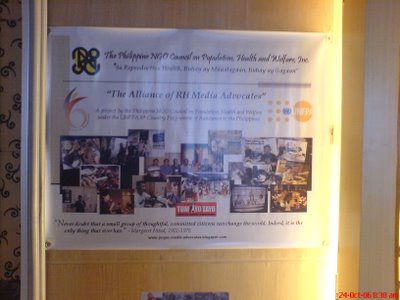

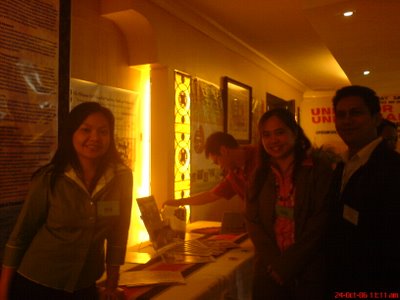 VG of PLCPD, Russel and Luis of POPCOM-PMO...
VG of PLCPD, Russel and Luis of POPCOM-PMO...
Posted by PhilMADE at 11:44 AM 0 comments
Thursday, November 09, 2006
Sunday, November 05, 2006
Defending Our Faith
Read on...
===================================================
For this priest, sex ‘a good thing,’ Church made it ‘bad’
By Vincent Cabreza
Inquirer, Last updated 07:04am (Mla time) 10/25/2006
Published on page A4 of the October 23, 2006 issue of the Philippine Daily Inquirer
BAGUIO CITY -- There are a handful of Catholic priests in the Philippines who will tell you sex is a "good thing." A few will even admit it's the Church's fault for making sex "a bad thing."
Teachers and pastors here met one of these outspoken priests last week during a training retreat sponsored by the Institute of Women's Studies that was devoted to gender sensitivity. Some of the participants appeared surprised to hear a priest reveal how the Church had propagated sexism in Philippine society.
Fr. Percy Juan Bacani, a moral theologist and superintendent of high schools operated by the Diocese of Baguio, said the Catholic doctrine on "guilt" had very much eroded Filipinos' appreciation for, and even enjoyment of, sex. The Church, he said, is a male-dominated power center where the female plays a far diminutive role. It is this ideological foundation which explains why Filipino women today are less valued than women of an ancient Filipino culture where they were revered. Women who shine in Catholic societies only achieve their ambition by imbibing the male culture, or by sustaining the myth "that the only good women are virgins," Bacani said.
It is an ongoing struggle, he later told the Inquirer.
Click here to read more:
http://newsinfo.inq7.net/inquirerheadlines/nation/view_article.php?article_id=28142
Posted by PhilMADE at 1:16 AM 0 comments
Friday, November 03, 2006
RP Exceeds Target: 2.4 Million Filipinos Stood Up Against Poverty

![]()
![]()
![]()
![]()
![]() Lets Stand Up Against Poverty!
Lets Stand Up Against Poverty!
Oct.18, Manila--- In a feisty show of unity and strength, 2,411,121 Filipinos from Baguio in Northern Luzon to Sulu and Tawi-Tawi in Southern Mindanao joined the Tumayo Tayo Pilipinas Campaign (Stand Up Against Poverty) in numerous events held by the UN System in the Philippines and its partners from the government, non-government organizations, private sector, academe and media on the eve of Oct. 15 up until the eve of Oct. 16.
The UN in the Philippines and its partners had initially aimed to have at least 1 million Filipinos joining the campaign. Instead, they breezed past their target by 100% at the close of counting on Oct. 16. Even after the official receipt of reports from across the country had ended, numerous organizations still continued to send in their attendance reports, signifying huge support from various stakeholders from all walks of life.
Stand Up Against Poverty, the rallying event of the United Nations’ Millennium Campaign to raise awareness on the Millennium Development Goals, now holds the official record title in the Guinness World Record for having the most number of people to “Stand Up Against Poverty” in 24 hours on 15-16 October with a total of 23,542,614 people from 87 countries who participated in 11,646 events around the globe.
The bulk of the numbers came from Asia and the Pacific, with an aggregate total of 18 million who rallied behind the MDG awareness campaign. In Asia and Pacific, India topped the race for the number of people at 9,731,983. Nepal came in second with 3,131,584 while the Philippines was third at 2,411,121. Other countries in Asia Pacific which participated included Bali, Bangladesh, Bhutan, China, Hong Kong, Indonesia, Japan, Kyrgyzstan, Laos, Nepal, Republic of Maldives, Pakistan, Singapore, South Korea, Sri Lanka, Thailand, Vietnam and others.
Topping the list for the top 10 organizations which had the most number of participants in the country was DepEd, Region 3-Central Luzon, with 1,772,202 participants, followed by Dep Ed Region 3-Bulacan, 358,300; DepEd Region 9-Davao, 220,568; DepEd Nueva Ecija, 190,470; DepEd Region 10-Davao Oriental, 83,191; Philippine UN White Helmets Commission and Association, 80,560; DepEd-Nueva Ecija (2nd report) with 43,717; DepEd Region -Dagupan with 29,313; DepEd Zambales with 25,582 and DepEd-Gapan City, 22,377.
The official counting in the Philippines was validated and officiated by representatives from the Sycip, Gorres, Velayo & Co. accounting firm, a UN partner for the Philippine campaign dubbed Tumayo Tayo Pilipinas. Details and photos of the campaign may be downloaded at www.millenniumcampaign.ph
The Tumayo Tayo Pilipinas campaign aimed to raise awareness on the state of poverty in the country in the context of meeting the MDGs by 2015. The campaign also celebrated the significant local gains made for the achievement of the MDGs and called on duty-bearers to hurdle the complex challenges facing the country ahead.
In September 2000, 191 UN-member countries, rich and poor alike, reaffirmed their commitment to peace and security, good governance and attention to the most vulnerable with the adoption of the Millennium Declaration. Containing commitments to achieve the eight MDGs, the declaration reflects the vision of entire nations, working together with international and country-based organizations to wipe out poverty and the worst forms of human deprivation and lay the foundations for sustainable human development by 2015.
Tumayo Tayo Pilipinas featured a lead flag-raising ceremony integrating the Tumayo Tayo pledge, read in Filipino by President Gloria Macapagal-Arroyo. It was organized by government officials led by the National Commission for Culture and the Arts, National Anti-Poverty Commission, Office of the PA on Culture, Department of Education, Department of Social Welfare and Development and the League of Municipalities, among others. Similar Tumayo Tayo moments were integrated in flag-raising ceremonies held at the Senate, Congress and Supreme Court, demonstrating the full participation of the legislative, executive and judiciary branches of government.
On center stage was the MDG Festival held in Marikina City, an MDG resource city. An MDG Rock Concert was held on Oct. 15 at Freedom Park in Marikina, followed by the Marikina City flag-raising Tumayo Tayo moment, partners exhibitions, social artistry programme showcase, the launch of the UN’s World Investment Report 2006, a Konsyertong Bayan Laban sa Kahirapan and the UNDP’s Galing Pook Special Citation on Local Capacity Innovations for the MDGs.
The UN’s various partners for the campaign staged their own events. In Baguio City, the Philippine Non-Government Organization Council had comedians, clowns and artists painting sad faces to get people to sign a petition condemning widespread poverty.
In Quezon City, the Global Call for Action Against Poverty, another UN partner for the campaign, formed a human chain, signifying unity against poverty. Other events were also held in Los Banos, Laguna, Pampanga, Eastern Samar, Sulu and Tawi-Tawi and various parts of the country.
Posted by PhilMADE at 5:17 PM 0 comments
Wednesday, November 01, 2006
MDGs BY 2015
The 8 MDGs break down into 18 quantifiable targets that are measured by 48 indicators. Click here for a full list of Goals, Targets and Indicators
Goal 1: Eradicate extreme poverty and hunger
Goal 2: Achieve universal primary education
Goal 3: Promote gender equality and empower women
Goal 4: Reduce child mortality
Goal 5: Improve maternal health
Goal 6: Combat HIV/AIDS, malaria and other diseases
Goal 7: Ensure environmental sustainability
Goal 8: Develop a Global Partnership for Development
The fight against poverty does not end after the succesful STAND UP event in various parts of the country and of the world. It was in fact a renewal of the commitment of different nations. From there, the momentum gained in raising the awareness of the people on the MDGs must be channeled to concrete efforts designed to alleviate the conditions of the poor and marginalized sectors of our society. Though several programs and interventions exist in pursuit of these goals, it is crucial that these initiatives be sustained by the government both in the national and local level. As such, the 2007 Local Elections is critical. It bears stressing that the public officials who will be voted into office must be politicians who are working and will continue to work towards the attainment of the MDGs for a better Philippines. That being said, our task is to intensify our advocacy campaign so the people and the politicians will work together towards development.
By telling them that development is about mothers not dying when they give birth, about children surviving their first few years, about getting every child into primary school, making sure that people have access to clean water where they live, then we will have concrete ways of framing the objectives for development.
As UN-Secretary General Kofi Annan said, "It is not in the United Nations that the Millennium Development Goals will be achieved. They have to be achieved in each country by the joint efforts of the Governments and the people ."
/rafs
======================================
The devastating effect of poverty on women (in general):
- If a girl is educated for six years or more, as an adult, her prenatal care, postnatal care and childbirth survival rates will dramatically and consistently improve.
- Educated mothers immunize their children 50 percent more often than mothers who are not educated.
- AIDS spreads twice as quickly among uneducated girls than among girls that have even some schooling.
- The children of a woman with five years of primary school education have a survival rate 40 percent higher than children of women with no education.
- A woman living in sub-Saharan Africa has a 1 in 16 chance of dying in pregnancy. This compares with a 1 in 3,700 risk for a woman from North America.
- Every minute, a woman somewhere dies in pregnancy or childbirth. This adds up to 1,400 women dying each day-an estimated 529,000 each year-from pregnancy-related causes.
- Almost half of births in developing countries take place without the help of a skilled birth attendant.
More than one billion people—one-sixth of the world’s population—live in extreme poverty, lacking the safewater, proper nutrition, basic health care and social services needed to survive. This means a single episode of disease, an ill-timed pregnancy, a drought or a crop-destroying pest can be the difference between life and death. In many of the poorest countries, life expectancy is half of that in the high-income world—40 years instead of 80 years.
The consequences of this poverty reach far beyond the afflicted societies. Poverty, inequality and disease are chief causes of violent conflict, civil war and state failures. A world with extreme poverty is a world of insecurity.
Posted by PhilMADE at 2:49 PM 0 comments
Monday, October 30, 2006
Upcoming Events-World AIDS Day and PopDev Week
 World AIDS Day: 01 December: Stop AIDS. Keep the Promise
World AIDS Day: 01 December: Stop AIDS. Keep the PromiseTo end the pandemic means keeping our promises and commitments in the fight against HIV and AIDS. That is why the World AIDS Campaign (WAC) has chosen the following as its theme from 2005 - 2010: Stop AIDS. Keep the Promise.
The Theme for World AIDS Day 2006 is accountability.
The theme of accountability was developed by the World AIDS Campaign support team based on their ongoing work around World AIDS Day, and based on the outcomes of the London HIV and AIDS Campaigning and Advocacy meeting in February 2005. A number of lessons have been learnt from previous work on World AIDS Day, and far more energy is being invested early in the year to make World AIDS Day 2006 a success. The most significant aspect of this World AIDS Day is the degree to which it has been based around the inputs of a wide range of civil society partners.
Background on the Theme
After two decades of AIDS, we know that with sufficient will and resources we can turn this epidemic around. In June 2001 Heads of State and government representatives gathered for the United Nations General Assembly Special Session on HIV/AIDS (UNGASS). This was the first time a meeting such as this one recognized that AIDS was a global crisis requiring global action.
Since the adoption by 189 countries of the UN Declaration of Commitment on HIV/AIDS, additional promises have been made to strengthen the response to AIDS. The "3 by 5" global target to provide three million people living with HIV and AIDS in resource limited settings with life-prolonging antiretroviral treatment (ART) by the end of 2005 was another important commitment on which the WAC campaigned. This initiative was launched by the World Health Organization and UNAIDS in December 2003 and it was a milestone on the road to universal ART access for all who need it, and a powerful way to complement and accelerate prevention efforts but it was not achieved. Now we have a new one for Universal Access by 2010 agreed by the G8 in July 2005. On top of this are commitments like the Abuja Declaration made by members of the African Union and many more.
Everyone has a role to play in fighting HIV and AIDS and as Kofi Annan, UN Secretary General, said at the UN General Assembly Special Session on HIV/AIDS, "All of us must recognize AIDS as our problem. All of us must make it our priority."
Posted by PhilMADE at 5:52 PM 0 comments
Wednesday, October 18, 2006
Snapshots from Marikina STAND UP Event
in the Stand UP Event in Marikina
Mr. Wilnor Papa (Amnesty International) and
Ms. Cristina "Ging" Cristobal (Forum)

Mr. Tomas Osias, Executive Director of the Commission on Population giving his message
 Time for the Stand Up Pledge
Time for the Stand Up Pledge
Posted by PhilMADE at 1:11 PM 0 comments
More photos re: the Stand UP Events...
 EV Espiritu (Media Coordinator, Ifugao) put finishing touches on the clown's face (Mao Victa, Manila Bulletin) before hitting session road... (Photo by Rick Reyes)
EV Espiritu (Media Coordinator, Ifugao) put finishing touches on the clown's face (Mao Victa, Manila Bulletin) before hitting session road... (Photo by Rick Reyes)
 The other clown selling condoms.... (Photo by Rick Reyes)
The other clown selling condoms.... (Photo by Rick Reyes) As UN Secretary-General Kofi Annan puts it: "The Millenium Development Goals (MDGs), particularly the Eradication of Extreme Poverty and Hunger, cannot be achieved if questions of Population and Reproductive Health are not squarely addressed."
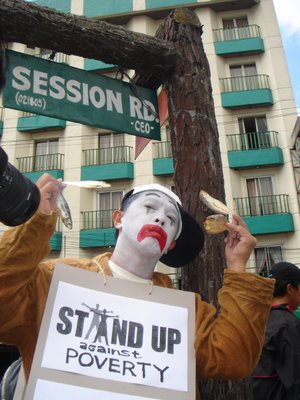
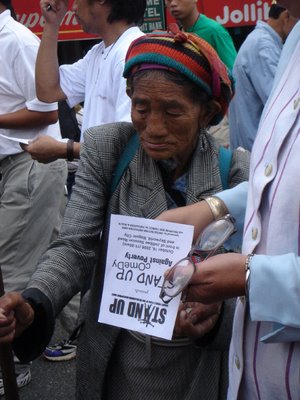 Last two photos by EV Espiritu, PDI-Northern Luzon
Last two photos by EV Espiritu, PDI-Northern Luzon
 Sultan Kudarat pics by Gina Belmes, Radyo Natin-Isulan
Sultan Kudarat pics by Gina Belmes, Radyo Natin-Isulan
![]()
 Photos in Upi shared by Alih Anso, dxUP-FM Maguindanao
Photos in Upi shared by Alih Anso, dxUP-FM Maguindanao
Posted by PhilMADE at 11:21 AM 0 comments
Tuesday, October 17, 2006
Snapshots during STAND UP AGAINST POVERTY Initiatives in the areas...
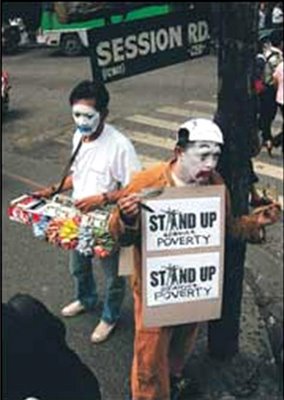 In Baguio City, the Media Advocates from the Cordillera Region
In Baguio City, the Media Advocates from the Cordillera Regionorganized their own "Stand UP" event with their
Read the full story by Vincent Cabreza, PDI-Northern Luzon at: http://newsinfo.inq7.net/inquirerheadlines/nation/view_article.php?article_id=27089
Sultan Kudarat Media Advocates, in coordination with
the LGU of Sultan Kudarat held their own
Stand UP event at the New Capitol Building in the Province
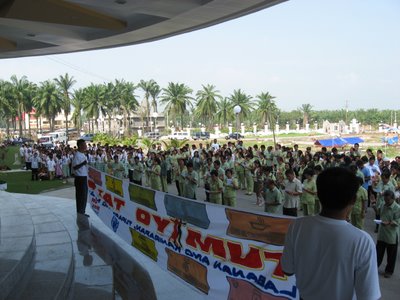
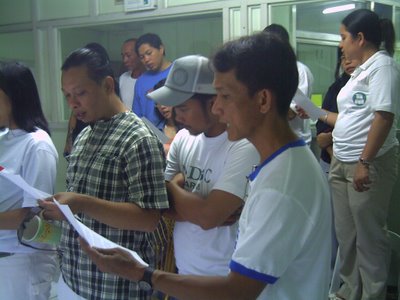 In Cotabato City, Notre Dame Broadcasting Corporation employees
In Cotabato City, Notre Dame Broadcasting Corporation employees
joined the Stand Up activity at 9 a.m., Oct 16, 2006. It was held in their studio, with eighteen (18) employees reciting the pledge. The MDG songs have been played repeatedly throughout the day in both AM and FM radio stations dxMS-AM and dxOL-FM.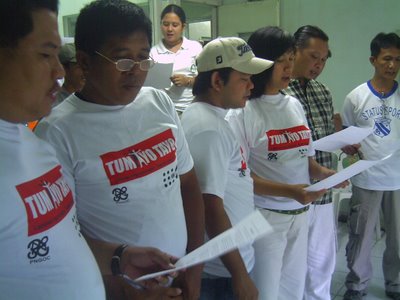
For a glimpse of the STAND UP Event at Upi, Maguindanao, click the following link:
Posted by PhilMADE at 10:17 AM 0 comments
Saturday, October 07, 2006
Stand Up. Be Counted. Act Now.
Stand Up is an exciting and innovative global challenge of the Millennium Campaign, which will attempt to set an official Guinness World Record for the most number of people ever to Stand Up Against Poverty on October 15-16, 2006.
Stand Up is a mobilization initiative designed to coincide with global mobilizations around the International Day of Poverty Eradication and the White Band Day of the Global Call to Action Against Poverty.
Stand Up aims to raise awareness of the Millennium Development Goals (MDGs) and publicly demonstrate the growing global support for the achievement of the Goals.
Stand Up is the opportunity for organizations to be part of this global event in support of poverty eradication and the achievement of the MDGs.
It is an occasion to showcase laudable efforts and accomplishments towards the attainment of the MDGs as well as pose the challenge for sustaining and even accelerating the efforts.
II. Tumayo Tayo Pilipinas
Inspired by the idea of this campaign, the United Nations system in the Philippines will use the month of October – recognized as “UN Month” – as a platform for MDG advocacy. UN-led activities are organized throughout the month.
What?
Underpinning the October events is the theme: “Stand Up Against Poverty. Stand Up for Millennium Development Goals”, which capitalizes on the global Stand Up event of the Millennium Campaign.
In the Philippines, the goal is to have at least 1 million Filipinos stand up and be counted from 15-16 October 2006. Simultaneous and parallel events will be organized nation-wide and enrolled to adopt the common logo, theme, slogan and Stand Up moment.
The campaign encourages a large number of national and local partners including people’s organizations, national government, local government units, non-government organizations, the private sector, academe and media to participate.
Some of the events being organized with the National Commission for Culture and Arts (NCCA) and UN – Habitat MDG Resource Cities to date are as follows:
Lead flag-raising ceremony in Malacañang with President Gloria Macapagal-Arroyo and the Office of the United Nations Resident Coordinator;
Simultaneous flag-raising ceremonies in national government offices and public schools nationwide; and
Satellite events in MDG resource cities and events organized by partners will be enrolled to the Stand Up Campaign.
Central Event: MDG Festival
The central event will be a two-day event such as an MDG Festival will have a line-up of cultural shows, concert with local pop bands, performers, artists, dances, and other presentations throughout the event. This will be open to the public and will feature songs from the MDG Album, “Tayo Tayo Rin Sa 2015” will be performed.
RockEd, UN Habitat and partner organizations that are in the field of performing arts and visual arts will take the lead in providing performers and exhibitors for the two-day festival.
When?
The MDG Festival is organized by RockEd Philippines, from 2 p.m. Sunday, 15 October 2006 at till Monday, 16 October 2006. Schedules and programme is subject to change upon further advice.
Where?
The central event will be held at the Marikina City Quadrangle City Hall. Marikina City is one of the 29 MDG resource cities under UN Habitat’s MDG Localization programme.
Who Can Join?
Universities, non-governmental organizations (NGOs), civil society organizations, primary and secondary public schools and other key MDG partners representing the youth sector can join the Festival.
How To Be Counted?
Throughout the festival, the audience shall be counted by standing up all at the same time during key performances within the day. News bits, greetings and official counts from the other Stand Up events around the country will also be flashed from time to time in the Festival venue.
I. Present the Stand Up concept, rationale and objectives - 5 minutes;
II. Recite the Stand Up Pledge - 2 minutes; and
III. Play the MDG video or community singing - 3 minutes.
Differently-abled people will be counted as long as they are present at the Stand Up moment and can perform an appropriate action of their choice.
What to Wear
In the tradition of white bands symbolizing the global fight against poverty and hunger (MDG#1), participants are encouraged, where possible, to wear white tee-shirts and/or white bands during the Stand Up event you are joining either on October 15 or 16, 2006.
Logo
As part of the local campaign, a Filipinized logo version was developed. This logo is prescribed to be used by all MDG partners. Soft copy of the logo may be downloaded at the website www.millenniumcampaign.ph.
The Filipino translation, “Tumayo Tayo Labanan ang Kahirapan. Tuparin ang MDGs”, conveys the desire to stand and work together, as well as putting a sense of urgency, which is reinforced in the phrase “Tuparin ang MDGs”.
Participating in the global event answers the Filipinos’ need to connect to people and to be part of something big, something greater than the individual – something noble. The central Stand Up event in Metro Manila, with parallel events in other parts of the country, plays on the Filipinos’ penchant for gathering together as a community and is the best avenue for a bandwagon effect to increase the number of people who will be counted for the Guinness Record and raise awareness desired for the MDGs.
Slogan
Organizations may also use the slogan “Stand Up...” or “Tumayo Tayo...” as part of the their event’s title. For instance, Stand Up for Peace. Stand Up for a Better World is being used by the Department of Foreign Affairs (DFA) for the UN week celebration.
This will deliver a unified theme and a synchronized list of activities among MDG partners.
§ All Stand Up actions will be counted between 6 p.m. (EST) Sunday, 15 October to 6 p.m. (EST) Monday, 16 October 2006.
§ People should intentionally stand up from a seated position first (Differently-abled people will be counted as long as they are present at the Stand Up moment and can perform an appropriate action of their choice);
§ All Stand Up actions must be monitored, counted and registered according to the below process that have been verified by Guinness;
§ There should be no duplications in the counting process;
§ Where possible, images and video of the action should be captured and sent with submission;
§ Where non-web forms are used, i.e. fax, to submit information, one independent witness should sign and verify the number of event participants;
§ For participants who are unable to stand at an organized event an alternative virtual stand up can be arranged via text message; and
§ A Guinness adjudicator will be present at the New York office of the Millennium Campaign to oversee the count worldwide.
Images and video of the action, where possible, should be captured and sent to the official website or text to MDG 2948 for Globe and Sun and 3940 for SMART
Posted by PhilMADE at 9:40 PM 0 comments







